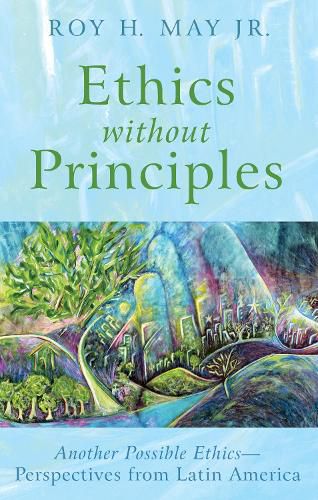Readings Newsletter
Become a Readings Member to make your shopping experience even easier.
Sign in or sign up for free!
You’re not far away from qualifying for FREE standard shipping within Australia
You’ve qualified for FREE standard shipping within Australia
The cart is loading…






This title is printed to order. This book may have been self-published. If so, we cannot guarantee the quality of the content. In the main most books will have gone through the editing process however some may not. We therefore suggest that you be aware of this before ordering this book. If in doubt check either the author or publisher’s details as we are unable to accept any returns unless they are faulty. Please contact us if you have any questions.
Ethics in the West too often equates morality with universal moral principles, thus imposing lifestyles and moral criteria that do not respect differences and local histories. Even Christianity proposes ethics that is based on eternal, absolute and universal truths or principles, independent of sociocultural and historical contexts. The problem is that these universal moral laws become a means of social control to exclude those who are different: non-Christian religions, nonwhite races, non-Western cultures, and poor and marginalized social classes everywhere. To these can be added minorities marginalized because of sexual orientation, physical handicaps, and women of all sectors and cultures. Another kind of ethics is urgent. For these reasons, Christians in Latin America and other parts are seeking innovative ways of envisioning ethics from their marginalized and discriminated social locations in order to find another possible ethics, an ethics that is not universal and not based on eternal truths or principles, but rather is contextual and historical and that takes into account real-life realities. Only an ethics that does this will be liberative. Important steps toward this other possible ethics have been taken by the theology of liberation by developing a contextual and intercultural morality.
$9.00 standard shipping within Australia
FREE standard shipping within Australia for orders over $100.00
Express & International shipping calculated at checkout
This title is printed to order. This book may have been self-published. If so, we cannot guarantee the quality of the content. In the main most books will have gone through the editing process however some may not. We therefore suggest that you be aware of this before ordering this book. If in doubt check either the author or publisher’s details as we are unable to accept any returns unless they are faulty. Please contact us if you have any questions.
Ethics in the West too often equates morality with universal moral principles, thus imposing lifestyles and moral criteria that do not respect differences and local histories. Even Christianity proposes ethics that is based on eternal, absolute and universal truths or principles, independent of sociocultural and historical contexts. The problem is that these universal moral laws become a means of social control to exclude those who are different: non-Christian religions, nonwhite races, non-Western cultures, and poor and marginalized social classes everywhere. To these can be added minorities marginalized because of sexual orientation, physical handicaps, and women of all sectors and cultures. Another kind of ethics is urgent. For these reasons, Christians in Latin America and other parts are seeking innovative ways of envisioning ethics from their marginalized and discriminated social locations in order to find another possible ethics, an ethics that is not universal and not based on eternal truths or principles, but rather is contextual and historical and that takes into account real-life realities. Only an ethics that does this will be liberative. Important steps toward this other possible ethics have been taken by the theology of liberation by developing a contextual and intercultural morality.